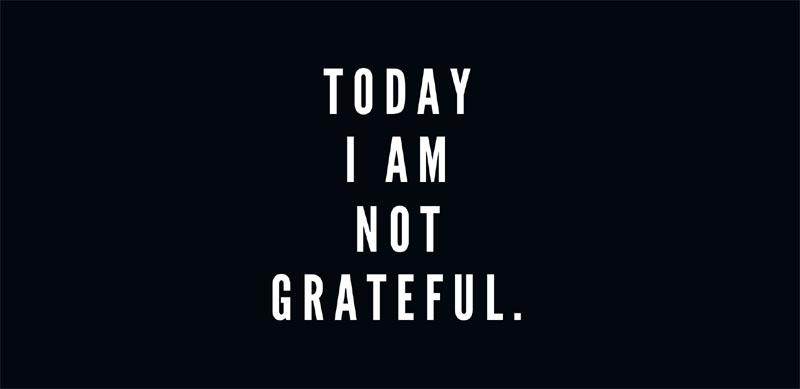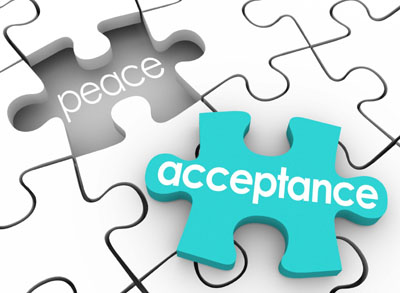Can’t. Be. Grateful.

Key: Gratitude, vital for wellness, can be blocked by our resistance or over-focus on hardships though we have the power to choose our perspective.
Living it: Practicing every-day positive acceptance of our hardships while improving what we can.
Clinical Concept: Life-application of positive psychological techniques surrounding acceptance and perspective-shifting as a means of promoting gratitude amid daily challenges.
“Gratitude is the tactical nuke of happiness…”
–
Eric Barker, Psychological Author
Barking Up the Wrong Tree
Yesterday, Thanksgiving dinner. After the prayer and a heartfelt farewell to a beloved family member who passed away this year, we began to go around the table and share what we were grateful for. We include young and old with the same respect and thus we will get answers that range from “my family” to “booger noses and big sharks.”
Unbeknownst to my family, I’ve spent this month researching this article, which is actually about not being grateful. I’m a very grateful person and I firmly believe the science which shows gratitude will help us live longer, happier, more mentally fit lives. I’ve written about it a lot, see? I even track my level of gratitude every three days to make sure that I’m living what I believe. This is why I found, towards the end of last month, that I wasn’t living gratefully. I had been given news that my work-life was changing, and I was not happy about it. It’s just career stuff; I’m not ill or dying. But my attitude about this change was affecting my positive focus, my work and my interactions with others.

In short, I was not able to be grateful because I wasn’t yet accepting this change. In fact, I was actively resistant. I was the worst enemy to my own gratitude and thus, my own wellbeing. Dr. Robert Emmons is the director of the Emmons Laboratory at the University of California, Davis and “arguably the nation’s leading gratitude researcher.” He found that the ability to accept hardships and find a “perceived benefit” is “part of a person’s psychological immune system…which helps convert tragedy into opportunity,” and I was blocking that ability with a lack of acceptance (Foley, 2013).
I wonder how many of us struggled to find something to say we were thankful for yesterday. I wonder if there were some who just faked it or said “pass” because they felt they had nothing. I’m sure there were, just as there were others who may have chosen to stay home or had no place to go which makes gratitude a significant challenge. We all struggle to find something to be grateful for at times. It’s a painful place to be. The way out is to let go.
Accepting Acceptance
“Acceptance doesn’t mean resignation; it means understanding that something is what it is and that there’s got to be a way through it.”
-Michael J. Fox, Actor and Survivor
After overcoming his own struggle accepting a sudden life-changing medical condition, Dr. Steve Taylor, best-selling author and senior lecturer in psychology at Leeds Beckett University, became interested in the process of acceptance as key to finding happiness and thriving despite the “turmoil and trauma” faced by so many of us. “I found that …all of the people who underwent ‘transformation through suffering’ – as I called it – experienced a ‘moment of acceptance,’ when they gave up resisting their predicament” (Taylor, 2013).
Acceptance is as challenging as it is vital, and the value of it increases exponentially with the size of the hardship. Now, Dr. Taylor makes the assertion, and I totally agree, that there are some things one should never accept like abuse, neglect, violence and other willful harms upon ourselves. But we face things every day which we can shrug off and move on—and they’re different for each of us. The gratitude-block comes in when we hit something that seems too big too accept. Our inner protector, rebel or sometimes toddler rears up in the face of the unacceptable, folds its arms and digs in its heels. We become resistant to the change.

And like that, we’re stuck.
As the title of this article says, we can’t accept and thus we can’t be grateful. That “can’t” begins to infect other parts of our lives and suddenly we’re not grateful for much, or happy much. Bitterness sets in.
The desperate irony is that often resistance is a reaction to a feeling of powerlessness in the face of change; that the defiant “no!” is the only strong choice we have. But what we’ve actually done is given our power away. Acceptance is power just as gratitude is power because both are an active choice. The “can’t” is really a “won’t.” We may not always get to choose what happens to us. But we can always choose how we respond to it. Dr. Taylor’s research found that acceptance “didn’t mean that they stopped trying to get better, or to rebuild their lives. It just meant that they faced up to the full reality of their state, and stopped trying to resist it in a rigid, adversarial way.” The moment we give up resisting we get our power back and we can then put it into action adapting, growing, striving to improve despite our hardship and appreciating all those other things which remain positive in our lives.
Both Dr. Emmons and Dr. Taylor encourage us to practice acceptance and gratitude when the stakes are low, so that we’re strong when it really matters. “Our lives are full of neutral situations which are made pleasant or unpleasant by our mental attitude and our thoughts,” Dr. Taylor said (2013). “There are many experiences and activities in our lives which aren’t innately negative, and which could easily be neutralized – or even made pleasant – by the alchemical power of acceptance.”
Here, the day after Thanksgiving, I am glad that I was able to find my own acceptance, and in doing so, recall the overwhelmingly large amount of things I am grateful for in my role as a clinician and counselor, the love of a truly amazing family and an abundance of wacky friends. Also, I’m grateful for you, readers. No matter if you’ve been with me for years or new just today, I’m glad that you found a home here. You’re welcome and accepted here. Please, use some of that acceptance on those things which have you stuck and are stealing your gratitude. Thanksgiving may have passed, but our grateful journeys begin anew every day.

Foley, D. (2013) What It Takes To Get Through Tough Times: How a little advanced gratitude can change everything. Prevention Magazine. Retrieved from: http://www.prevention.com/mind-body/emotional-health/what-it-takes-get-through-tough-times
Taylor, S. (2013) The Power of AcceptanceHow an Attitude of Acceptance Can Transform your Experience. Psychology Today. Retrieved from: https://www.psychologytoday.com/us/blog/out-the-darkness/201304/the-power-acceptance

 Previous Post
Previous Post Next Post
Next Post
So well said and gave me a lot to think about including putting some of my struggles in perspective so that I can truly be thankful. Thank you- this is something that i needed to hear.
Thank you and I’m so glad it provoked some thinking. We all need perspective in our struggles. Please reach out to me if ever you would like to!